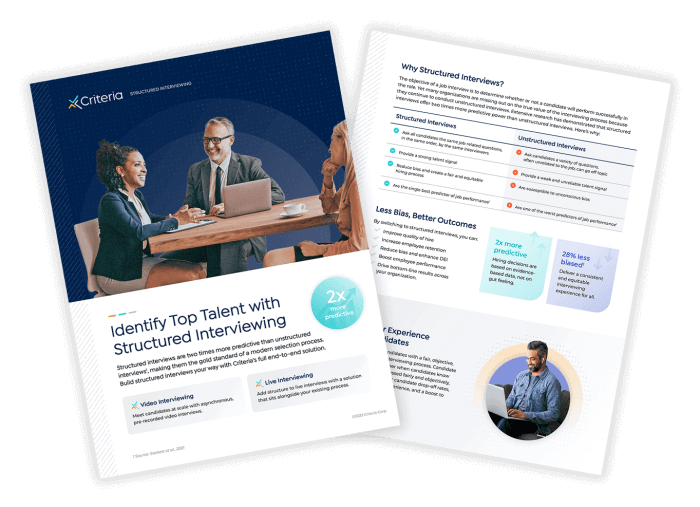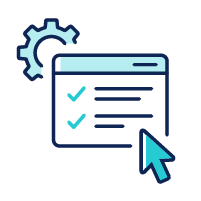STRUCTURED INTERVIEWING
Hire Better with Structured Interviews
Structured interviews are two times more predictive than unstructured interviews, but they don’t have to be two times the work. Take your interviews to the next level with flexible tools made for the way you work.

Structured Interviews, Your Way
Whether you want to interview candidates in-person, over video, pre-recorded, or a combination of methods, Criteria offers a full end-to-end solution that makes structured interviewing easy.
Video Interviewing
Meet candidates at scale with asynchronous, pre-recorded video interviews.

Live Interviewing
Add structure to live interviews with a solution that sits alongside your existing process.

Structured Interviews, Defined
A structured interview involves asking all candidates the same job-related questions, in the same order, by the same interviewers. Each answer is then evaluated using an anchored rating scale.
Structured interviews are the strongest predictor of overall job performance according to the latest research in I/O psychology. A recent meta-analysis of the predictive validity of various selection methods found that structured interviews were two times more predictive than unstructured interviews (Sackett, 2022).


Say Goodbye to Unstructured Interviews
Structured interviews are 2x more predictive of job performance than unstructured interviews. But what is the impact of doubling the predictiveness of your hiring decisions? By switching to structured interviews, you can:
• Improve quality of hire
• Increase employee retention
• Reduce bias and enhance DEI
• Boost employee performance
• Drive bottom-line results
Double the Predictiveness.
Not Double the Work.
Developing a structured interview process can feel like a daunting task. We’ve heard from customers that some of the biggest barriers to conducting structured interviews include writing the questions, convincing every interviewer to follow the same process, and gathering all the results together in a clean, consistent way.
Criteria’s structured interviewing solution is designed to combat each of these barriers.
One of the hardest parts about conducting structured interviews is writing the questions and ensuring that each interviewer follows the same process. Criteria’s structured interviewing tools make it easy to apply structure to your interviews through user-friendly technology.
Reduce Bias with Structured Interviews
One of the best benefits of conducting structured interviews is that it reduces bias by cutting through the noise and providing a strong, clear talent signal.
Unstructured interviews are flawed because they lead to meandering conversations that have nothing to do with the job at hand. This can cause interviewers to be swayed by irrelevant information – like the candidate’s hobbies, interests, or things they have in common.
Structured interviews are objective, fair, and have less adverse impact than unstructured interviews. Structured interviews enable your evaluators to get to the heart of the most important question: can the candidate do the job?


Structured Interviews are Better for Candidates
Structured interviews lead to a better candidate experience. Why? An interviewer that is able to follow a structured guide will be more prepared and more organized during the interview. Plus, structured interviews provide every candidate the same opportunity to shine by receiving the same questions.
Candidate satisfaction is higher when candidates know they are being assessed fairly and objectively.
Schedule a Demo
Ready to double your chances of making a good hire? Request a demo of Criteria's structured interviewing solution.
Want to learn more about structured interviewing?
Discover Criteria's full end-to-end structured interviewing solution and start making better talent decisions!



